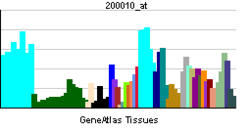60S ribosomal protein L11
| View/Edit Human | View/Edit Mouse |
60S ribosomal protein L11 is a protein that in humans is encoded by the RPL11 gene.[3][4][5]
Function
Ribosomes, the organelles that catalyze protein synthesis, consist of a small 40S subunit and a large 60S subunit. Together these subunits are composed of 4 RNA species and approximately 80 structurally distinct proteins. This gene encodes a ribosomal protein that is a component of the 60S subunit. The protein belongs to the L5P family of ribosomal proteins. It is located in the cytoplasm. The protein probably associates with the 5S rRNA. Alternative splice variants encoding different isoforms may exist, but they have not been fully characterized. As is typical for genes encoding ribosomal proteins, there are multiple processed pseudogenes of this gene dispersed through the genome.[5]
Interactions
RPL11 has been shown to interact with:
References
- ↑ "Human PubMed Reference:".
- ↑ "Mouse PubMed Reference:".
- ↑ Kenmochi N, Kawaguchi T, Rozen S, Davis E, Goodman N, Hudson TJ, Tanaka T, Page DC (Aug 1998). "A map of 75 human ribosomal protein genes". Genome Res. 8 (5): 509–23. doi:10.1101/gr.8.5.509. PMID 9582194.
- ↑ Graphodatsky AS, Vorobieva NV, Filipenko ML, Voronina EV, Frengen E, Prydz H (Jun 1999). "Assignment of the L11 ribosomal protein gene (RPL11) to human chromosome 1p36.1→p35 by in situ hybridization". Cytogenet Cell Genet. 84 (1–2): 97–98. doi:10.1159/000015228. PMID 10343117.
- 1 2 "Entrez Gene: RPL11 ribosomal protein L11".
- ↑ Koldamova RP, Lefterov IM, DiSabella MT, Almonte C, Watkins SC, Lazo JS (Jun 1999). "Human bleomycin hydrolase binds ribosomal proteins". Biochemistry. 38 (22): 7111–7. doi:10.1021/bi990135l. PMID 10353821.
- 1 2 3 Zhang Y, Wolf GW, Bhat K, Jin A, Allio T, Burkhart WA, Xiong Y (Dec 2003). "Ribosomal protein L11 negatively regulates oncoprotein MDM2 and mediates a p53-dependent ribosomal-stress checkpoint pathway". Mol. Cell. Biol. 23 (23): 8902–12. doi:10.1128/mcb.23.23.8902-8912.2003. PMC 262682
 . PMID 14612427.
. PMID 14612427. - ↑ Dai MS, Sun XX, Lu H (Jul 2008). "Aberrant expression of nucleostemin activates p53 and induces cell cycle arrest via inhibition of MDM2". Mol. Cell. Biol. 28 (13): 4365–76. doi:10.1128/MCB.01662-07. PMC 2447154
 . PMID 18426907.
. PMID 18426907. - ↑ Bernardi R, Scaglioni PP, Bergmann S, Horn HF, Vousden KH, Pandolfi PP (Jul 2004). "PML regulates p53 stability by sequestering Mdm2 to the nucleolus". Nat. Cell Biol. 6 (7): 665–72. doi:10.1038/ncb1147. PMID 15195100.
Further reading
- Wool IG, Chan YL, Glück A (1996). "Structure and evolution of mammalian ribosomal proteins". Biochem. Cell Biol. 73 (11–12): 933–947. doi:10.1139/o95-101. PMID 8722009.
- Mishin VP, Filipenko ML, Muravlev AI, Karpova GG, Mertvetsov NP (1995). "[Cloning and determination of the primary structure of DNA complementary to the mRNA of human ribosomal protein L11]". Bioorg. Khim. 21 (2): 158–60. PMID 7748210.
- Kato S, Sekine S, Oh SW, Kim NS, Umezawa Y, Abe N, Yokoyama-Kobayashi M, Aoki T (1995). "Construction of a human full-length cDNA bank". Gene. 150 (2): 243–250. doi:10.1016/0378-1119(94)90433-2. PMID 7821789.
- Koldamova RP, Lefterov IM, DiSabella MT, Almonte C, Watkins SC, Lazo JS (1999). "Human bleomycin hydrolase binds ribosomal proteins". Biochemistry. 38 (22): 7111–7117. doi:10.1021/bi990135l. PMID 10353821.
- Andersen JS, Lyon CE, Fox AH, Leung AK, Lam YW, Steen H, Mann M, Lamond AI (2002). "Directed proteomic analysis of the human nucleolus". Curr. Biol. 12 (1): 1–11. doi:10.1016/S0960-9822(01)00650-9. PMID 11790298.
- Voronina EN, Kolokol'tsova TD, Nechaeva EA, Filipenko ML (2003). "[Structural and functional analysis of the human ribosomal protein L11 gene]". Mol. Biol. (Mosk.). 37 (3): 425–35. PMID 12815950.
- Lohrum MA, Ludwig RL, Kubbutat MH, Hanlon M, Vousden KH (2004). "Regulation of HDM2 activity by the ribosomal protein L11". Cancer Cell. 3 (6): 577–587. doi:10.1016/S1535-6108(03)00134-X. PMID 12842086.
- Odintsova TI, Müller EC, Ivanov AV, Egorov TA, Bienert R, Vladimirov SN, Kostka S, Otto A, Wittmann-Liebold B, Karpova GG (2004). "Characterization and analysis of posttranslational modifications of the human large cytoplasmic ribosomal subunit proteins by mass spectrometry and Edman sequencing". J. Protein Chem. 22 (3): 249–258. doi:10.1023/A:1025068419698. PMID 12962325.
- Zhang Y, Wolf GW, Bhat K, Jin A, Allio T, Burkhart WA, Xiong Y (2003). "Ribosomal protein L11 negatively regulates oncoprotein MDM2 and mediates a p53-dependent ribosomal-stress checkpoint pathway". Mol. Cell. Biol. 23 (23): 8902–8912. doi:10.1128/MCB.23.23.8902-8912.2003. PMC 262682
 . PMID 14612427.
. PMID 14612427. - Bhat KP, Itahana K, Jin A, Zhang Y (2004). "Essential role of ribosomal protein L11 in mediating growth inhibition-induced p53 activation". EMBO J. 23 (12): 2402–2412. doi:10.1038/sj.emboj.7600247. PMC 423289
 . PMID 15152193.
. PMID 15152193. - Bernardi R, Scaglioni PP, Bergmann S, Horn HF, Vousden KH, Pandolfi PP (2004). "PML regulates p53 stability by sequestering Mdm2 to the nucleolus". Nat. Cell Biol. 6 (7): 665–672. doi:10.1038/ncb1147. PMID 15195100.
- Dai MS, Lu H (2004). "Inhibition of MDM2-mediated p53 ubiquitination and degradation by ribosomal protein L5". J. Biol. Chem. 279 (43): 44475–44482. doi:10.1074/jbc.M403722200. PMID 15308643.
- Rual JF, Venkatesan K, Hao T, Hirozane-Kishikawa T, Dricot A, Li N, Berriz GF, Gibbons FD, Dreze M, Ayivi-Guedehoussou N, Klitgord N, Simon C, Boxem M, Milstein S, Rosenberg J, Goldberg DS, Zhang LV, Wong SL, Franklin G, Li S, Albala JS, Lim J, Fraughton C, Llamosas E, Cevik S, Bex C, Lamesch P, Sikorski RS, Vandenhaute J, Zoghbi HY, Smolyar A, Bosak S, Sequerra R, Doucette-Stamm L, Cusick ME, Hill DE, Roth FP, Vidal M (2005). "Towards a proteome-scale map of the human protein-protein interaction network". Nature. 437 (7062): 1173–1178. doi:10.1038/nature04209. PMID 16189514.
- Dai MS, Shi D, Jin Y, Sun XX, Zhang Y, Grossman SR, Lu H (2006). "Regulation of the MDM2-p53 pathway by ribosomal protein L11 involves a post-ubiquitination mechanism". J. Biol. Chem. 281 (34): 24304–24313. doi:10.1074/jbc.M602596200. PMC 1783840
 . PMID 16803902.
. PMID 16803902. - Lindström MS, Jin A, Deisenroth C, White Wolf G, Zhang Y (2007). "Cancer-associated mutations in the MDM2 zinc finger domain disrupt ribosomal protein interaction and attenuate MDM2-induced p53 degradation". Mol. Cell. Biol. 27 (3): 1056–1068. doi:10.1128/MCB.01307-06. PMC 1800693
 . PMID 17116689.
. PMID 17116689.
